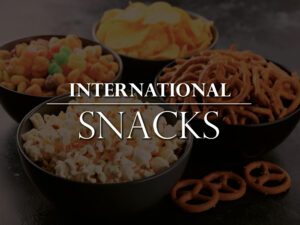International Confectionery Editor, Roshini Bains, converses with Adrian Ling, the ‘Vegan Willy Wonka’ and CEO of Plamil Foods, to discuss the need for alternative chocolates.
1) Can you tell us about the history of Plamil, why it started, and what is the company’s ethos?
Plamil, the first vegan company, was started in the 1950’s by those that were at the start of the vegan movement. I am proud that my father was one of those, together was Leslie Cross and others. Their motivation was to produce animal free products and firstly this meant producing a dairy free alternative to milk. Indeed, Plamils name came from PLAnt MILk.
In its early days, our company researched many solutions to producing alternative meat and dairy products, but it also had to sell to a very limited consumer base….. and those were in the days without internet! It was soon recognised that the company had to manufacture the products itself as no company was interested in making plant-based products.
In the early 1980’s, Plamil started to make chocolate at its own factory and included the first milk alternative chocolate, later becoming the UK’s first organic registered chocolate producer.
Plamil chocolate has come a long way since those early days but we’ve concentrated our efforts in the last decade in a long-term strategy, using our experience of the changing and growing plant based and vegan market.
This means not only producing retail products and focusing on vegan chocolate but also Plamil focuses on producing chocolate as an ingredient for many other manufacturers, which make everything including chocolate cookies to enrobing bars.
2) What does plant-based products mean? And why is it so important to Plamil?
There’s quite a difference between ‘plant based’ and vegan, with many not being quite sure of how the two define themselves together.
Indeed, there are quite a few that are seemingly confused by this.
The definition of vegan is to be ‘animal free’, yet many vegan trademarks allow for contamination- under ‘may contain milk’ or something similar. This is counter intuitive to many.
I have come to the conclusion, after a lifetime in the vegan world, that veganism and ‘to be vegan’ is a journey in which each individual consumer has their own definition to which they themselves define. Some are on their first step, whilst others have made many. However quite simply vegan food is or is not animal free. As brand values can take many years to develop this is important for manufacturers and brands to understand these differences and the movement in consumers between plant based and vegan.
The understanding of this will enable manufacturers to position and formulate their products for now and the future, as it should be remembered foods made now for those on the start of their vegan journey and what is acceptable to those consumers now, may change as more progress to the original vegan definition of animal free.
3) Why do you think there has been a recent higher consumer demand for alternative, sustainable products like yours?
There is no doubt that the combination of many factors coming together, such as social media, environmental concerns. The greater the choices, the greater consumer participation, the more manufacturers want a slice of the ‘vegan cake’.
Learning from being ‘too early’ in the market, too advanced, Plamil has worked in a dual approach to the market for the last decade. In addition to an extensive retail range, Plamil has also concentrated on manufacturing chocolate as an ingredient, recognising that the joy of chocolate is used in a plethora of consumer choices.
4) Why is strict ingredient control so important to Plamil? And why do you disapprove of genetically modified ingredients?
I was a speaker at an Oxford University debate in 2020, ‘veganism and GMO’s’, To me this crystallised the argument against using GMO’s ‘on our planet’.
There is little evidence that GMO’s, can solve many factors that political solutions could not solve better. Whilst it sounds farfetched, work is being undertaken at the University into colonising Mars. We have in the last few years come to realise that our planet is very special, and that we must protect our environment. Indeed, the philosophy can be extrapolated to one that states we must not ‘pollute and alter the natural balance of our plant. GMO’s may well be fine for use on other planets in the future but let’s leave our ‘mother planet’ natural.
5) What does “ethically sourced ingredients” mean to you?
Plamil have been an advocate for a higher ethical standard in the food chain for decades, especially in the cocoa trade.
Personally, I could not sleep at night knowing we made chocolate for others to enjoy, working to make a profit on the backs of child slave labour.
‘Ethical,’ however can have many meanings. Mostly it is about doing what’s right, and or telling the truth. With there being still too much ‘greenwashing’ and over simplified solutions to complex issue. This is applicable to ingredients, packaging, and the companies themselves.
Companies need to look past what z generation are looking for. If authenticity is being sought by this generation, then the next generation will demand it.
6) What do you believe will be the next big industry trend?
There has been a dominance of major brands, which protect their brand values. This has however locked them into protecting products that the rapidly changing market is moving away from.
With combined z generation expectations of authenticity and ethical purchasing, web-based sales means that many new brands and start-ups have and are taking a larger market share than they would have had a decade ago.
It is vital that brands understand ingredients and brand values can no longer be static from one decade to another, with simple changing of a marketing nuance for the same product.
This is the challenge for all brands; – the ability to evolve their products to meet changing consumer demands.
One thing will however always remain; chocolate has the ability to bring joy to the consumer. That joy will no longer be just about tasting great.
Media contact
Roshini Bains,
Editor, International Confectionery
Tel: +44 (0) 1622 823 922
Email: editor@in-confectionery.com









